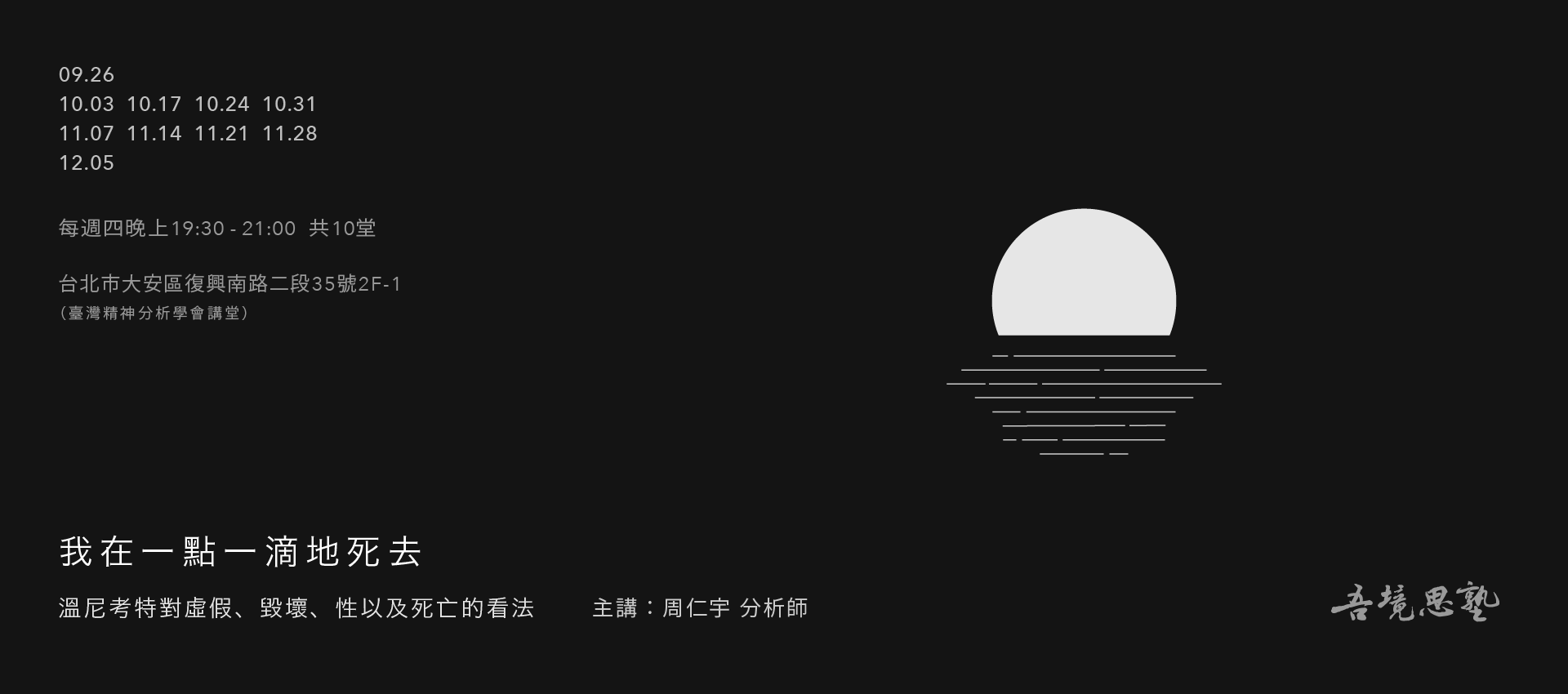- 兒童精神科醫師;西雅圖華盛頓大學人類學博士;國際精神分析學會(IPA)訓練分析師。

人們總是誤解溫尼考特,以為他如詩般的文章只談愛與自由,以為他只會歌頌光明,不敢面對黑暗;以為他只關心母親和嬰孩,忽略父親與性特質。
然而,他之所以如此貼近母嬰,是因為對男性與女性元素的洞見;之所以能踫觸殘酷的真相,是因為有著大無畏的溫柔;而他的作品之所以扣人心弦,是因為他對死亡的凝視直通生命的深處。
本課程透過溫尼考特的視野,去凝視各種型式的死亡,以及從那裡面源源不絕湧出的力量。
課程大綱:
[9/26]
1.虛假:用假我的謊言來保護真實的自我
D.W. Winnicott (1960) Ego Distortion in Terms of True and False Self. In The Maturational Processes and the Facilitating Environment: Studies in the Theory of Emotional Development. London: Karnac Books.
Dodi Goldman (2010). Vital sparks and the form of things unknown. In Jan Abram 2013. (eds.) Donald Winnicott Today. New York: Routledge.
[10/3]
2.自戀:對於愛自己這回事的徹底解構
Zeljko Loparic (2010). From Freud to Winnicott: aspects of a paradigm change. In Jan Abram 2013. (eds.) Donald Winnicott Today. New York: Routledge.
René Roussillon (2010). Winnicott’s deconstruction of primary narcissism. In Jan Abram 2013. (eds.) Donald Winnicott Today. New York: Routledge.
[10/17]
3.窒息:死亡母親情結
André Green (1973). The dead mother. In On Private Madness. Madison, CT: International University Press. Pp. 142-173.
Christopher Bollas (1999). Dead mother, dead child. In The Dead Mother: The Work of André Green.London: Routledge.
[10/24]
4.無聊:放棄為自己的生命創造意義
Ogden, T.H. (1995). Analyzing forms of aliveness and deadness of the transference-countertransference.IJPA76:695-709
Parsons, M. (1999). The Logic of Play in Psychoanalysis. IJPA80:871-884
[10/31]
5.迷失:流浪在起點與終點之間
André Green(1997). The intuition of the negative in Playing and Reality. IJPA78:1071-1084
André Green (1975). The analyst, symbolization and absence in the analytic setting - in memory of D. W. Winnicott. IJPA56:1-22
André Green (2010). Sources and vicissitudes of being in D. W. Winnicott's work. Psychoanal Q., 79:11-35.
[11/7]
6.混亂:無效的框架、設置與作夢(畫)
Marion Milner (2010). Winnicott: overlapping circles and the two way journey. In Jan Abram 2013. (eds.) Donald Winnicott Today. New York: Routledge.
Thomas Ogden (2004). On holding and containing, being and dreaming. IJPA85(6):1349-1364
Parsons, M. (2007). Raiding the inarticulate: the internal analytic setting and listening beyond countertransference. IJPA88:1441-1456
[11/14]
7.毀滅:關於攻擊以及未完成的維也納大會手稿
Jan Abram (2010). DWW’s notes for the Vienna Congress 1971. In Jan Abram 2013. (eds.) Donald Winnicott Today. New York: Routledge..
Coline Covington (2017). Evil and destructiveness: a psychoanalytic view. In Everyday Evils: A Psychoanalytic View of Evil and Morality. New York: Routledge.
[11/21]
8.邊緣:消失的性特質以及消失的父親
Christopher Reeves (2010). The role of the father in Winnicott’s writings. In Jan Abram 2013. (eds.) Donald Winnicott Today. New York: Routledge.
Lesley Caldwell (2005). Sex and Sexuality: Winnicottian Perspectives. London: Karnac Books.
Haydée Faimberg (2014). The paternal function in Winnicott: the psychoanalytical frame. Int. J. Psycho-Anal., 95(4):629-640
[11/28]
9.謊言:治療師與個案的理想化共謀
Slochower, J. (2011). Analytic idealizations and the disavowed: Winnicott, his Patients, and us. Psychoanal. Dial., 21(1):3-21
Harry Guntrip (1996). My experience of analysis with Fairbairn and Winnicott. IJPA77:739-754
Margaret Little (1985). Winnicott working in areas where Psychotic Anxieties predominate. Free Associations, 1(3):9-42
[12/5]
10.死亡:真相與謊言的轉世輪迴
Haydée Faimberg ([1998]2012). Nachträglichkeit and Winnicott’s ‘Fear of Breakdown.’ In Jan Abram 2013. (eds.) Donald Winnicott Today. New York: Routledge.
D.W. Winnicott (1971). Playing: creative activity and the search for the Self. In Playing and Reality. London: Tavistock Publications
- 【線上報名】
-
- 2019年9月26日起,週四晚上19:30-21:00,共10堂。( 2019年9/26、10/3、10/17、10/24、10/31、11/7、11/14、11/21、11/28、12/5。10/10停課一次)